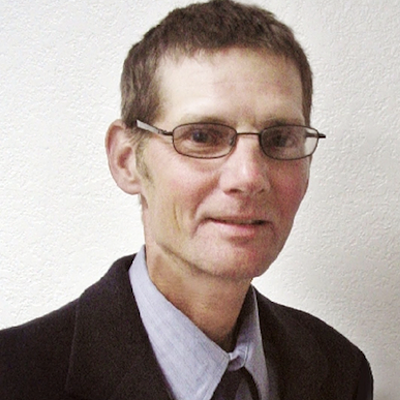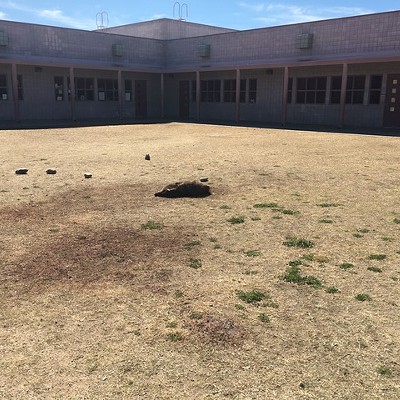Fluorescent lighting shed glaring illumination on the past, the future, and a bit of neo-linguistics recently, as Arizona Game and Fish commissioners scratched their heads over the massive Wildlife 2006 document.
Several inches thick and 93 pages long, the tome embodies AGF's mission plan for the next five years.
And so it was, on January 19, that the board gathered in a dreary little hut on the State Fairgrounds called the Wildlife Building to approve this policy masterwork. A sullen buffalo glared from his wall mount; an equally taxidermied sandhill crane twirled laconically from the drop-ceiling. No doubt keen students of irony, they witnessed history in the making as commissioners struggled with a bit of revived Latin arcana called enlibra.
Critics fear this little term could steer the already right-leaning commission further down a very dangerous path where wildlife protection takes a solid back seat to economic profiteering.
To the chagrin of many of those present--including environmentalists, wildlife activists and at least two of the five commissioners--the word surfaced several times in the headwaters of Wildlife 2006.
"If you understand what (enlibra) means and are willing to step through that door, I just hope you know where you're going with it," warned Don Farmer, president of the Arizona Wildlife Federation. "Because it could sure end up being the alternative-fuels fiasco for wildlife management in the state of Arizona."
He characterized the term as a deceptive warm-fuzzy favored by anti-federal government, Wise-Use (i.e. property-rights) extremists. Literally, enlibra means "in balance." But realistically, it's a strategy to allow federally subsidized ranchers and other "stakeholders" to screw with endangered species and habitat protection measures, he said.
Among other tenets suggested by enlibra is the notion of "takings," or compensating land-owners whenever their property is impacted by federal environmental laws.
Still unclear about definitions, Commissioner Dennis Manning of Alpine asked Farmer to explain what he thought enlibra meant in "25 words or less."
Farmer replied that he was mostly familiar with the word via those ultraconservative factions espousing it. "I do remember it hitting the newspapers four or five years ago when Governor Hull attended a Western Governors Association (conference)," he said. "I remember groups that embraced enlibra. You had People for the West, you had their successors, People for the USA. You had private property-rights extremists, you had 'takings' proponents. The way I look at it, if you've got those people embracing it, you had better find out what it means."
For example, Farmer said, when some rancher has "two-gazillion bales of hay" out in some pasture and it gets munched by elk, under the spirit of enlibra that rancher will then be able to "turn to the citizens of the state to pay" for his loss. "I contend that (under enlibra) all of our wildlife management money is going to be exhausted in very short fashion."
Several commission members looked troubled at this proposition, and that's when all eyes turned to Sue Chilton, squirming in her seat like a precocious schoolgirl simply bursting with the right answer.
Although no one has confessed to inserting the loaded Latin term into Wildlife 2006, the Arivaca rancherette and newly minted commissioner emerges as the prime suspect. Those suspicions weren't allayed when she blithely proceeded to take the enlibra bull by the horns, so to speak, saying her familiarity with the word came from her husband, rancher Jim Chilton, who discovered it at a Western Governors Association conference in Phoenix.
"Governor Hull was one of the primary persons on the panel at that time, along with (Utah) Governor Leavitt, and the other governors of the western states," Chilton said. "I don't think that constitutes a very radical group.
"The governors themselves took the material presented at that conference, and worked it up into a doctrine that, if my understanding is correct, essentially said 'Western states want the opportunity to have a voice in the control of their own resources.' That means control of their wildlife resources, as well as control of their other resources."
Chilton then spoke volumes about her own approach to wildlife management, and--in what's become a dismaying pattern of conflicted interests--pressed her point by taking aim at the Buenos Aires National Wildlife Refuge bordering her ranch. "We have seen today, right in this ... national refuge, an effort by a federal agency to usurp the right of the state of Arizona to manage its wildlife," she said.
"Enlibra, if I understand it correctly, is an effort by the Western governors to say each individual state has the right to make those decisions," she said. "And the term enlibra means 'in balance.' ... They were trying to keep in balance the interests of various constituencies in their state. They were trying to keep in balance the interests of various interests in their state, ... their ability to control their resources, and the ever-greater encroachment of the federal government to try to control the resources of the state."
That didn't seem to assuage the concerns of commissioners Manning and Mike Golightly; by meeting's end, they'd succeeded in removing all references to enlibra in Wildlife 2006. Gone were such gems as: "Enlibra is based on principles that endorse balance and stewardship as a means of resolving natural resource conflicts with economic development."
Or this: "Underlying Enlibra is the belief that the environment (including wildlife and wildlife habitat) can be protected, while at the same time providing such things as recreation, aesthetics, economic development, and employment opportunities to support a good and progressive standard of living."
Sound reasonable? Think again, says one longtime observer of state wildlife policy, who was extremely relieved to see the term extracted. "Enlibra is simply a code-word for Wise Use," says the activist, who asked to not be identified. "It's a way of compromising and finding solutions that are good for a healthy economy and sustainable use, with the emphasis on use. But you'll notice that people's lives and living on the land always come first under enlibra."
SO FROM WHENCE sprang this highly charged expression?
As stated by Chilton, enlibra was coined by governors Mike Leavitt of Utah and John Kitzhaber of Oregon, and first rose to prominence during the Environmental Summit on the West. That conference was convened in Phoenix in 1998 by the Western Governors Association, a group known for its anti-federal positions concerning land use. Leavitt in particular is infamous for his harsh stance against southern Utah's Grand Staircase-Escalante National Monument, created by Bill Clinton in 1996.
"We are making environmental progress in this country, but it's too slow, too cumbersome and too expensive," Leavitt told reporters at the time. "We need a way to increase the velocity of environmental progress."
Enlibra, he said, propelled that ambitious stride.
But Leavitt's verbiage rang hollow with many of the 400 manufacturers, ranchers, bureaucrats, lawyers, activists and politicos gathered at a Phoenix resort. Among them was Washington Rep. Jim Buck, who said enlibra threatens to "undermine the foundations of representative government" by substituting stakeholders for elected officials, and touting commercial collaboration over tough legislation.
It's worth noting that, although he didn't attend, future President George W. Bush was a member of the WGA at that time. And the Texas version of enlibra came under blistering attack by Ken Kramer, director of the Sierra Club's Lone Star Chapter.
"In other words," Kramer told the Seattle Times, "(Bush) has emphasized public relations over actual results. He has given the appearance of doing something about grandfathered air polluters, when in fact little has been accomplished compared to the magnitude of the problem. He has used the popular concept of voluntarism to make it appear that the problem will be taken care of by business leaders themselves without government action, when indeed that is not the case. This 'disconnect' between rhetoric and reality is what concerns us about enlibra."
The word does have its supporters, most obvious among them Sue Chilton, and a staffer at the WGA's Denver offices, who characterized the enlibra/property-rights linkage as "bullshit."
Regardless, it's uncertain how the term arrived in Wildlife 2006. Terry Johnson, esteemed head of the AGF department's non-game branch, said if he had his "druthers," the word wouldn't have appeared in the document at all, adding that its inclusion was directed by the commission during a November meeting.
By contrast, AGF commission chairman Hays Gilstrap says enlibra came from department staffers, and wasn't proposed by his board. But given the chairman's penchant for playing fast and loose with the truth, the Tucson Weekly will have to wait until minutes from that November meeting are published for proof-positive. We can only hope Gilstrap won't push to have any of that text deleted.
Either way, the fact that the word appeared even temporarily in a state document says less about balance than about the next step down a very slippery road toward asserting the rights of property over those of Arizona's dwindling wildlife.
As if that's anything new.












